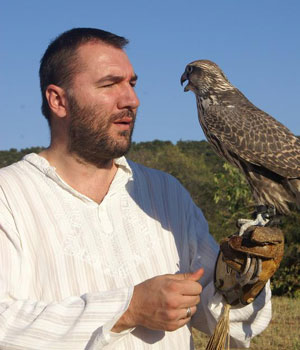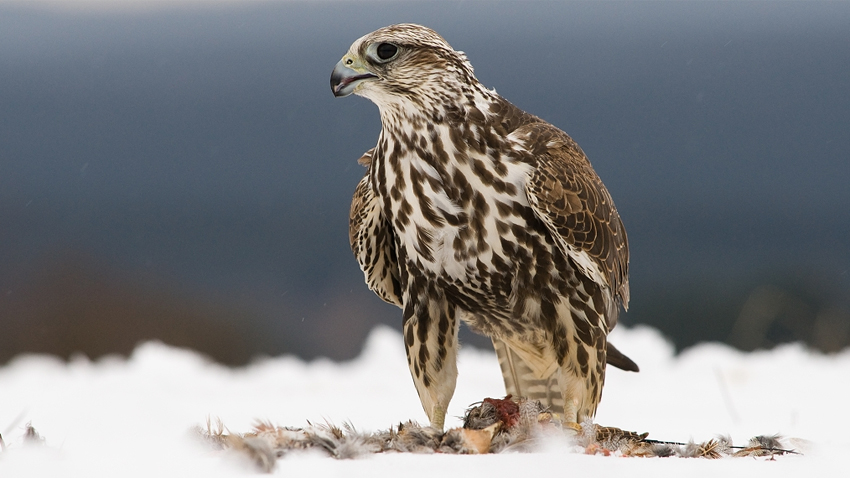There are quite a few songs in Bulgarian folklore, in which the falcon is described as a friend one can confide one’s sorrows to, a symbol of manly strength, the relentless Bulgarian spirit and the yearning for freedom and independence.
In our day, much of this romantic aura surrounding this freedom-loving bird has been lost. Yet, there is a handful of people who breed falcons and say it is a really pleasant and worthwhile endeavour.
 Pavel Yakimov from Sofia is among the most impassioned falcon breeders in Bulgaria. He has two university degrees – forestry and theology, but what attracts him most is the very nature of falcons. Pavel is founder of the Bulgarian Association for the Preservation of Wild Birds, the only organization dealing with the problems of game hawking. “Our aim is to popularize these ancient falconry methods, to acquaint the public with the problems connected with it and reduce stress for the birds,” says Pavel Yakimov. The biggest difference between the falcon and other birds of prey is in the hunting style. For example, the hawk and the eagle start their attack from the spot they are standing on, whereas the falcon literally glides high up in the sky. Here is more about the nature of birds of prey from falconer Pavel Yakimov:
Pavel Yakimov from Sofia is among the most impassioned falcon breeders in Bulgaria. He has two university degrees – forestry and theology, but what attracts him most is the very nature of falcons. Pavel is founder of the Bulgarian Association for the Preservation of Wild Birds, the only organization dealing with the problems of game hawking. “Our aim is to popularize these ancient falconry methods, to acquaint the public with the problems connected with it and reduce stress for the birds,” says Pavel Yakimov. The biggest difference between the falcon and other birds of prey is in the hunting style. For example, the hawk and the eagle start their attack from the spot they are standing on, whereas the falcon literally glides high up in the sky. Here is more about the nature of birds of prey from falconer Pavel Yakimov:
“There is a social and ecological angle to falconry. In hunting, the falcon catches prey once every 10 times it attacks. Provided the bird is taken out to hunt at least once a day, that means it shall catch 1, 2 or 3 animals at most, half the number, compared to rifle hunting. Unfortunately, out in the wild falcons are in danger because of poor conditions. Humans are the fiercest of all creatures.”
Pavel Yakimov says that anyone wanting to take up falconry should know that it takes time – not a single day should go by without taking the bird out hunting for at least an hour or two. And that this takes place out in the fields. The problem is that the Sofia plain is overdeveloped and you need to cover longer distances to get to open ground “People have penetrated the environment of wild birds to such an extent that we often see them inside cities with conflicts between man and nature growing more and more frequent,” says Pavel Yakimov.

“We, falconers have found a way to prevent these conflicts. We all know what a problem airports are for birds. As they are open, they attract all kinds of birds, mostly corvids, herring-gulls, sea-gulls and lots of pigeons. Take-offs and landings are the most critical times. Even one crow caught up in the engine could be disastrous. Natural methods are the only way to ward off bird attacks on vineyards, orchards, nursery-gardens, all places where there is conflict between man and nature. Imagine a wild bear entering this room now. There is no way we can grow accustomed to its presence, because it is at the top of the food chain. The feeling is the same with birds, because predators are at the top of the food chain. That is why the moment a bird of prey appears, incredible panic sets in. All animals in the surrounding area are scared away, though that does not necessarily mean any of them will be hurt. Using falcons in this way is the most environmentally friendly way of protecting monuments of culture or buildings of historical or economic significance from birds. Strangely enough, such methods are not employed at Sofia airport. A sound system is in place which chaotically blares out animal shrieks. Paradoxically, even while it is working, we have seen a crow perched on the loudspeaker itself and partridges flying close by. So, obviously the sound system is not very effective because you cannot apply artificial methods invented by humans in a natural environment.”
English version: Milena Daynova
Photos: private library and WikipediaNATO tests new 'no U.S.' mission model in Balkans NATO is testing its ability to deploy rapidly across Eastern Europe - without direct US support - as Washington shifts its approach to European defence and the war in Ukraine, the Associated Press..
Love blooms with renewed vigour every year on 14 February! Valentine's Day is increasingly being celebrated in Bulgaria as a holiday that inspires lovers to share beautiful moments together. Traditions include the exchange of cards, gifts and romantic..
From February 14 to 16, an event under the motto "Love and Wine" will allow Sofia residents and guests of the city to combine the Bulgarian holiday of wine Trifon Zarezan with Valentine's Day. It will be held on the pedestrian zone..
Exactly 3 years ago, on February 24, Russia’s invasion of Ukraine began – an event that woke up Europe 77 years after the end of World War II and called..

+359 2 9336 661
